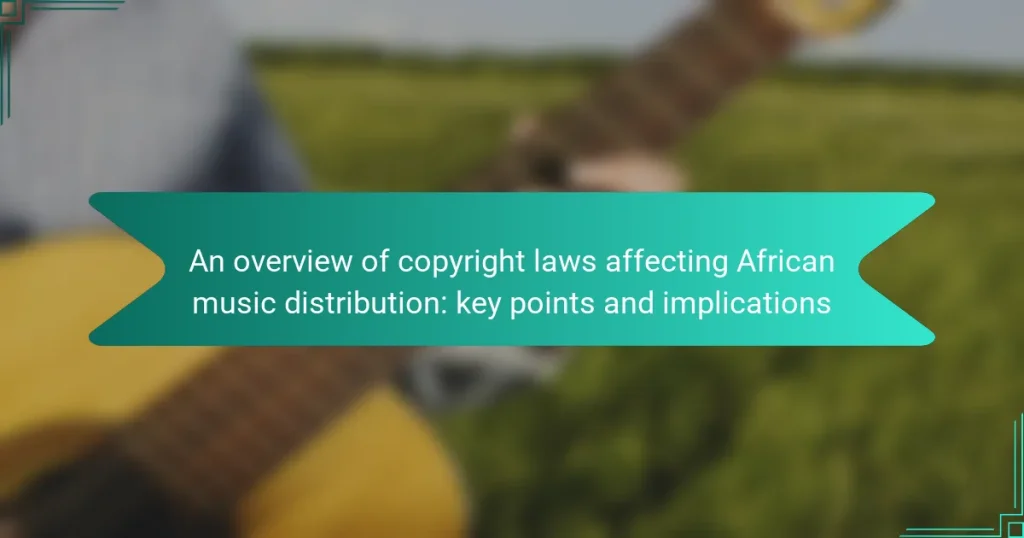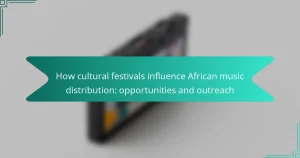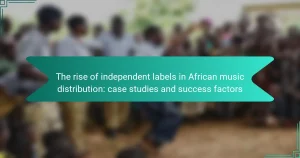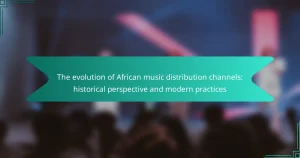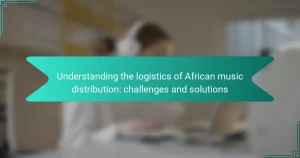Copyright laws play a crucial role in the distribution of African music, with key frameworks including the Berne Convention and various national copyright acts. The Berne Convention sets minimum standards for copyright protection among member countries, while individual nations like Nigeria and South Africa implement their own laws to safeguard creators’ rights and ensure fair royalties. The article outlines the differences in copyright legislation across African countries, highlighting specific acts such as Nigeria’s Copyright Act of 1988 and South Africa’s Copyright Act of 1978. It also discusses the role of the African Regional Intellectual Property Organization (ARIPO) in facilitating copyright registration and enforcement. Future trends indicate a shift towards enhanced digital rights management and stricter regulations to combat online piracy, ultimately aiming to empower artists in a rapidly evolving music industry.
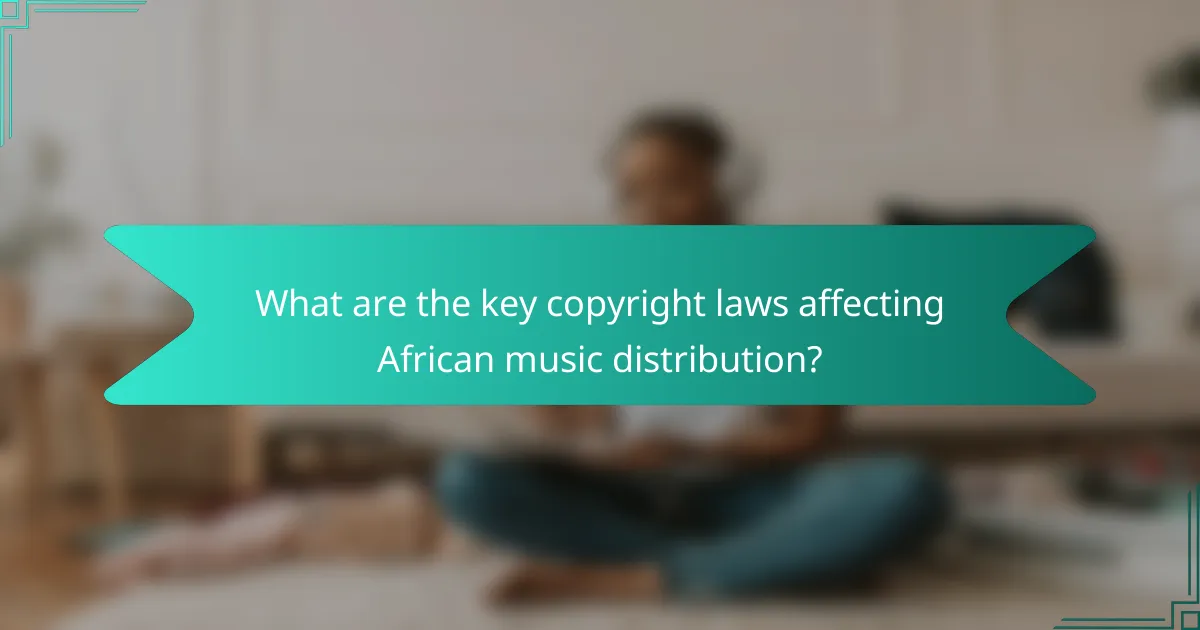
What are the key copyright laws affecting African music distribution?
Key copyright laws affecting African music distribution include the Berne Convention and national copyright laws. The Berne Convention establishes minimum standards for copyright protection among member countries. Countries in Africa, such as Nigeria and South Africa, have their own copyright acts that govern music distribution. These laws protect the rights of creators and ensure royalties for their work. For instance, the Copyright Act of Nigeria provides protection for musical works and establishes licensing requirements. Additionally, the African Regional Intellectual Property Organization (ARIPO) facilitates copyright registration and enforcement across member states. These legal frameworks aim to safeguard artists’ rights and promote fair distribution practices in the music industry.
How do these copyright laws influence the music industry in Africa?
Copyright laws significantly influence the music industry in Africa by protecting artists’ intellectual property rights. These laws enable musicians to earn revenue from their work through licensing and royalties. Stronger copyright enforcement can lead to increased investment in local music production. Additionally, it encourages the creation of original content rather than piracy. Countries with robust copyright frameworks, like South Africa, show a thriving music scene. Conversely, weak enforcement in other regions can hinder artist income and innovation. Overall, effective copyright laws are crucial for the growth and sustainability of the African music industry.
What are the historical contexts of copyright laws in African music?
Copyright laws in African music have evolved significantly over time. Initially, traditional music was often communal and not subject to copyright. In the colonial era, European copyright laws were imposed, limiting local control. Post-independence, many African nations began to establish their own copyright frameworks. The African Union’s 2006 Cultural Charter emphasized the protection of cultural heritage. In 2009, the African Copyright Organization was established to promote copyright awareness. These developments aimed to balance protecting artists’ rights with preserving cultural expressions. The historical context reflects a transition from colonial imposition to self-determination in copyright matters.
How do international copyright treaties impact African music distribution?
International copyright treaties significantly impact African music distribution by providing legal frameworks that protect artists’ rights globally. These treaties, such as the Berne Convention and TRIPS Agreement, establish minimum standards for copyright protection. They enable African artists to receive recognition and compensation for their work internationally.
The treaties facilitate cross-border distribution by ensuring that foreign entities respect African copyrights. This leads to increased opportunities for African music in global markets. Additionally, adherence to these treaties can attract foreign investment in the African music industry.
However, challenges remain in enforcement and local legal frameworks. Many African countries struggle with implementation, which can limit the benefits of these treaties. Overall, international copyright treaties play a crucial role in shaping the landscape of African music distribution.
What are the implications of copyright laws for artists and producers?
Copyright laws protect the creative works of artists and producers. These laws grant exclusive rights to reproduce, distribute, and perform their works. Artists can control how their music is used, which helps them earn revenue. Producers benefit from securing their investments in music production. Copyright infringement can lead to legal action, impacting both artists and producers financially. In Africa, enforcement of these laws varies, affecting revenue streams. Proper registration of works is essential for protection. Understanding copyright laws is crucial for navigating the music industry effectively.
How do copyright laws protect the rights of African musicians?
Copyright laws protect the rights of African musicians by granting them exclusive rights to their creative works. These laws allow musicians to control the reproduction, distribution, and public performance of their music. In many African countries, copyright laws are aligned with international agreements, such as the Berne Convention. This alignment helps ensure that African musicians receive recognition and financial compensation for their work globally. Additionally, local copyright organizations, like the South African Music Rights Organization (SAMRO), assist musicians in enforcing their rights. They collect royalties on behalf of artists when their music is played or sold. Copyright infringement can lead to legal action, providing a deterrent against unauthorized use of music. Overall, these laws are essential for protecting the economic interests and creative integrity of African musicians.
What challenges do artists face under current copyright regulations?
Artists face significant challenges under current copyright regulations. These challenges include limited protection of their works. Many artists struggle with enforcing their rights against unauthorized use. The complexity of copyright laws can also hinder artists from understanding their rights. Additionally, the lack of awareness about copyright among artists contributes to exploitation. Enforcement mechanisms are often weak, making it difficult for artists to pursue legal action. Furthermore, the digital landscape complicates copyright issues, as works can be easily shared without consent. These factors collectively undermine artists’ ability to profit from their creations.
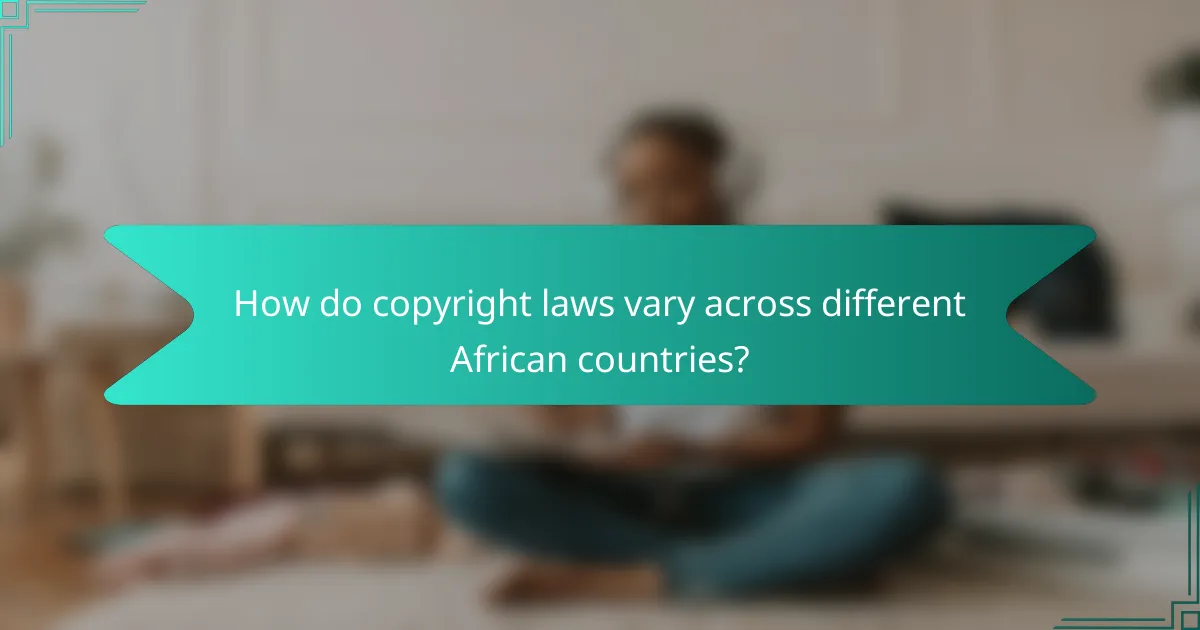
How do copyright laws vary across different African countries?
Copyright laws differ significantly across African countries. Each nation has its own legal framework governing copyright. For example, South Africa’s Copyright Act of 1978 provides extensive protections for authors. In contrast, Nigeria’s Copyright Act of 1988 includes provisions for moral rights but has faced enforcement challenges. Kenya’s Copyright Act of 2001 emphasizes the protection of indigenous works.
Furthermore, some countries have adopted regional agreements. The African Regional Intellectual Property Organization (ARIPO) facilitates copyright protection in member states. This leads to variations in enforcement and compliance levels. Overall, the diversity in legal frameworks affects music distribution across the continent.
What are the differences in copyright enforcement in various regions?
Copyright enforcement varies significantly across regions due to differing legal frameworks and cultural attitudes. In the United States, copyright laws are robust, supported by strict enforcement mechanisms and significant penalties for infringement. The Digital Millennium Copyright Act (DMCA) facilitates swift takedown requests for online infringements. In Europe, the European Union has harmonized copyright laws, but enforcement can differ among member states. For instance, Germany has strong protections, while enforcement in Eastern European countries may be less stringent.
In Africa, copyright enforcement is often challenged by limited resources and varying levels of legal awareness. Countries like Nigeria have made strides with the Copyright Act, but enforcement remains inconsistent. In contrast, South Africa has a more developed legal framework, yet piracy still poses significant challenges. Overall, the effectiveness of copyright enforcement is influenced by local legal structures, economic conditions, and cultural perceptions of intellectual property.
Which countries have the most robust copyright protections for music?
The countries with the most robust copyright protections for music include the United States, Germany, and the United Kingdom. These nations have comprehensive copyright laws that protect the rights of music creators. In the United States, the Copyright Act of 1976 provides strong protections for musical works. Germany’s copyright laws are known for their strict enforcement and protection of authors’ rights. The United Kingdom also has a well-established framework under the Copyright, Designs and Patents Act 1988. These countries are part of international agreements like the Berne Convention, which further strengthens their copyright protections.
How do cultural practices influence copyright law variations?
Cultural practices significantly influence variations in copyright law. Different cultures have unique approaches to creativity and ownership. These practices shape how copyright is perceived and enforced. For instance, in some cultures, communal ownership of music is prevalent. This contrasts with Western individualistic views of copyright. Such differences can lead to conflicts in international copyright agreements. Additionally, local customs may prioritize oral traditions over written documentation. This can complicate the protection of works in regions with strong oral histories. These cultural nuances necessitate tailored copyright laws that respect local traditions while aligning with global standards.
What role do local and regional organizations play in copyright enforcement?
Local and regional organizations play a crucial role in copyright enforcement by monitoring and protecting intellectual property rights. They facilitate the registration of copyrights for local artists and creators. These organizations also educate stakeholders about copyright laws and their implications. They often collaborate with law enforcement to address copyright infringement cases. Additionally, they advocate for stronger copyright protections within their jurisdictions. Their efforts help to ensure that creators receive fair compensation for their work. This is particularly important in regions with high levels of piracy. Such organizations contribute to a more sustainable creative industry by fostering respect for copyright.
How do these organizations support African musicians in copyright matters?
Organizations support African musicians in copyright matters by providing legal assistance and education. They help musicians understand their rights and the importance of copyright protection. These organizations often advocate for stronger copyright laws that benefit local artists. They also facilitate access to registration services for musical works. Additionally, they engage in awareness campaigns about copyright issues. This support helps musicians protect their intellectual property and earn fair compensation. Organizations like the African Music Rights Organization (AMRO) play a crucial role in these efforts. They ensure that African musicians can navigate complex copyright landscapes effectively.
What initiatives exist to improve copyright awareness among artists?
Initiatives to improve copyright awareness among artists include educational programs, workshops, and online resources. Organizations like the African Music Rights Organization provide training sessions on copyright laws. These sessions help artists understand their rights and the importance of copyright. Additionally, online platforms offer resources and guides on copyright registration. Collaborations with universities often result in seminars focused on intellectual property. Government agencies also promote awareness through public campaigns. These initiatives aim to empower artists and protect their creative works.
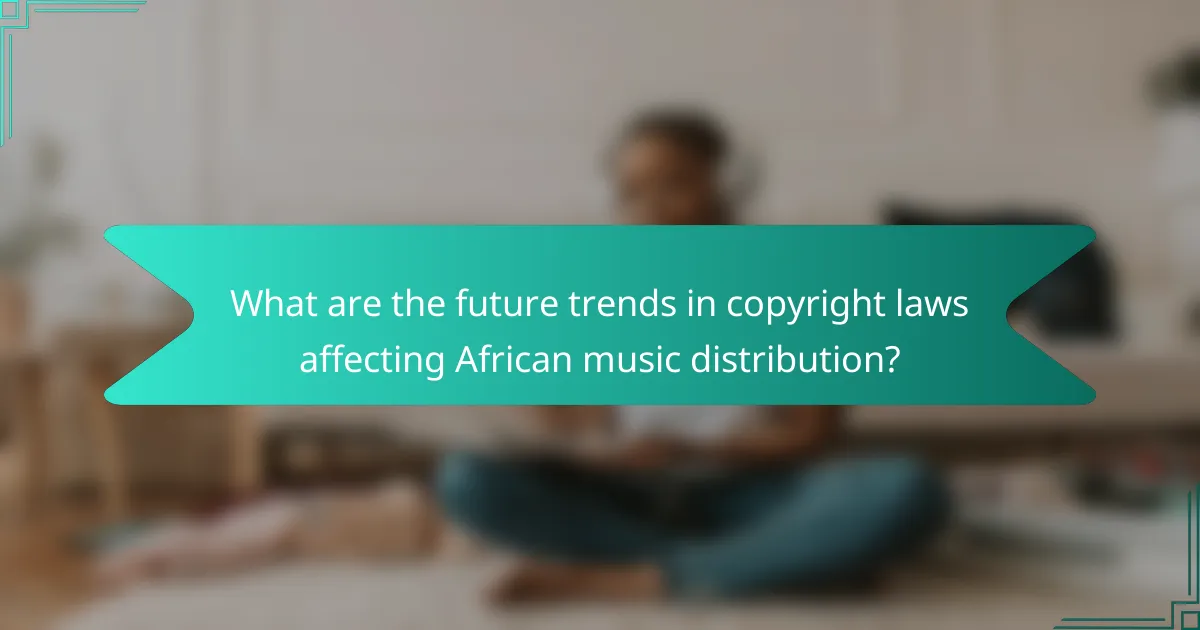
What are the future trends in copyright laws affecting African music distribution?
Future trends in copyright laws affecting African music distribution include increased digital rights management and enhanced protection for artists. As digital platforms grow, laws are adapting to address online piracy and unauthorized distribution. Countries are likely to adopt stricter regulations to ensure fair compensation for artists. Collaborative agreements between nations may emerge to protect cross-border music distribution. Additionally, there is a push for clearer guidelines on licensing and royalties in the digital space. These changes aim to empower artists and ensure their rights are upheld in a rapidly evolving market.
How might digital platforms change the landscape of copyright in music?
Digital platforms are transforming the landscape of copyright in music by enabling easier distribution and access. These platforms allow artists to share their music globally without traditional barriers. As a result, musicians can reach wider audiences directly. This shift challenges traditional copyright enforcement methods. Digital platforms often utilize automated systems for copyright detection. These systems can lead to quicker takedowns of infringing content. However, they may also result in legitimate content being flagged incorrectly. The rise of streaming services has changed revenue models for artists. Instead of relying on album sales, musicians now earn from streams. This new model raises questions about fair compensation and copyright ownership. Overall, digital platforms are reshaping how music is created, shared, and monetized.
What are the potential impacts of streaming services on copyright enforcement?
Streaming services significantly impact copyright enforcement by altering how content is distributed and consumed. They facilitate easier access to music, which can lead to increased piracy if not monitored. This shift challenges traditional copyright frameworks that rely on physical sales. Streaming services often require new licensing agreements, which can complicate enforcement. Additionally, they provide data analytics that can help identify unauthorized use. However, the global nature of these platforms may complicate jurisdictional enforcement. The rise of user-generated content on these platforms further blurs copyright lines. Overall, streaming services necessitate a reevaluation of existing copyright laws to effectively protect creators.
How can emerging technologies support copyright protection for musicians?
Emerging technologies can support copyright protection for musicians through blockchain and digital rights management (DRM). Blockchain technology allows for transparent and immutable record-keeping of music ownership. This ensures that musicians can track the usage of their work in real-time. Digital rights management systems help enforce licensing agreements and prevent unauthorized distribution. These systems can monitor streaming platforms for copyright infringement. Additionally, artificial intelligence can analyze music patterns to detect potential violations. The integration of these technologies enhances the security of musicians’ rights. According to a report by the World Intellectual Property Organization, blockchain can significantly reduce piracy and enhance revenue collection for artists.
What best practices should African musicians adopt regarding copyright?
African musicians should register their works with copyright offices to protect their intellectual property. This ensures legal recognition and safeguards against unauthorized use. They must also understand local copyright laws and international agreements that apply to their music. Knowledge of these laws helps in navigating rights and royalties effectively.
Additionally, musicians should utilize digital platforms that offer copyright protection features. These platforms can help monitor the use of their music online. Collaborating with legal experts in copyright can provide further clarity on rights management.
Finally, musicians should educate themselves about licensing agreements. Proper licensing can lead to fair compensation for their work. Following these best practices can enhance their ability to protect their music and earn revenue.
How can artists effectively manage their copyright claims?
Artists can effectively manage their copyright claims by registering their works with a copyright office. Registration provides legal evidence of ownership and is essential for enforcing rights. Artists should also keep thorough records of their creations and any agreements made. This documentation can support claims in disputes. Monitoring the use of their works online is crucial for identifying unauthorized use. Artists can use digital tools and services to track their music. Additionally, understanding local and international copyright laws helps in navigating claims effectively. Engaging legal professionals specializing in copyright can provide tailored advice and representation.
What resources are available for musicians to understand copyright laws?
Musicians can access various resources to understand copyright laws. These include the Copyright Office’s website, which provides comprehensive information on copyright registration and protection. Additionally, the World Intellectual Property Organization (WIPO) offers resources tailored for musicians and artists. Online courses and webinars from organizations like Berklee Online and Coursera cover copyright basics. Nonprofit organizations, such as the Music Rights Organization, provide guidance and support for musicians regarding copyright issues. Legal textbooks and guides specific to music law are also valuable resources. Many universities offer free resources through their law schools, focusing on copyright in the music industry.
The main entity of this article is copyright laws affecting African music distribution. The article provides a comprehensive overview of key copyright frameworks, including the Berne Convention and national acts from countries like Nigeria and South Africa, which protect the rights of artists and facilitate royalty collection. It discusses the historical evolution of these laws, their influence on the music industry, and the challenges faced by artists in enforcing their rights. Additionally, the article explores the impact of international treaties, local organizations, and emerging technologies on copyright protection, as well as best practices for musicians to manage their copyright claims effectively.
